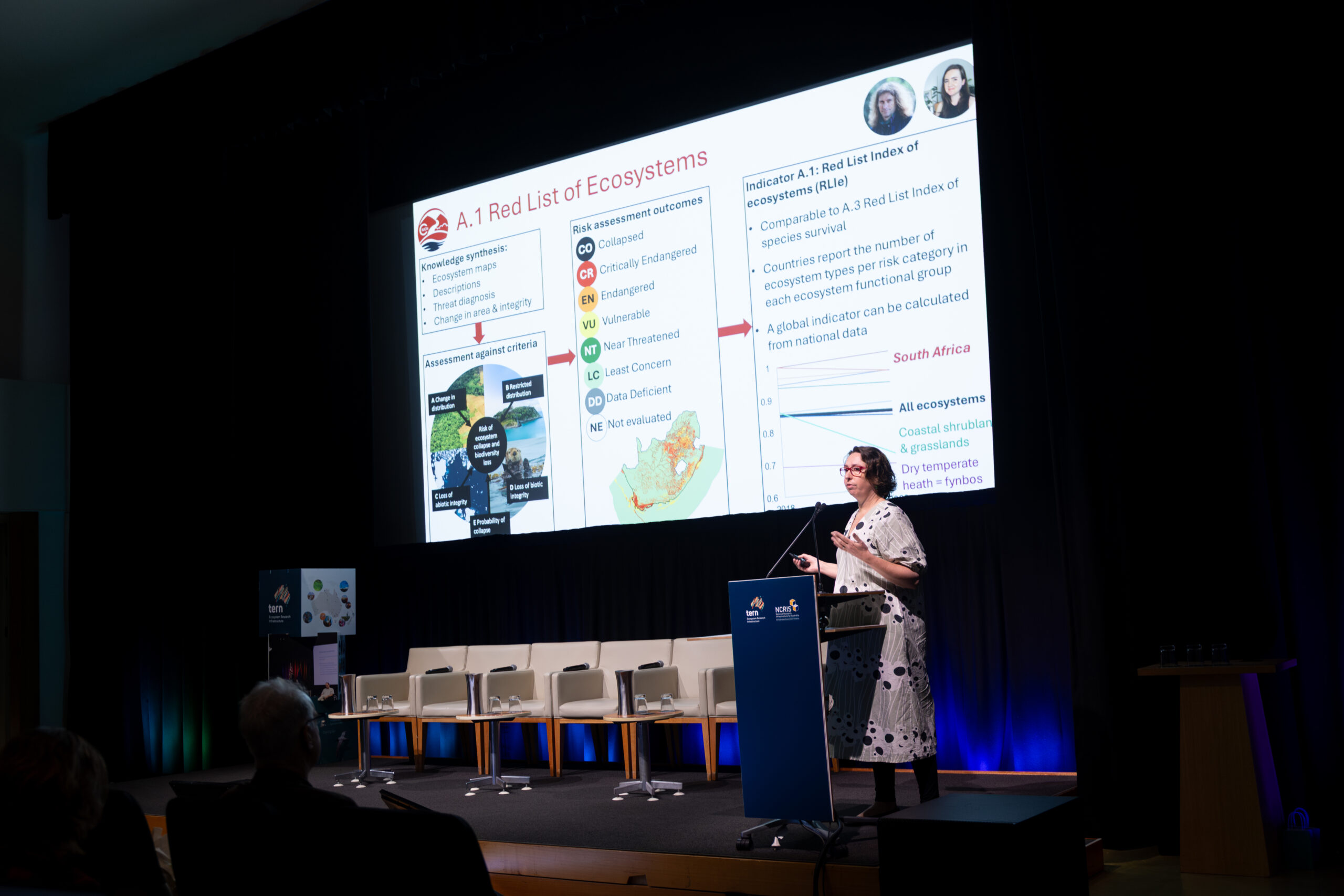With the keynote address provided by Professor Emily Nicholson from University of Melbourne, TERN’s Biennial Science Symposium showcased over 2 days just how much TERN and its community have advanced over the past 15 years.
These past months have seen so much happening in TERN! I’m writing this update with a real sense of momentum and purpose as we reflect on some significant milestones and look ahead to exciting opportunities.
Science Symposium Success
Our biennial Science Symposium from 2-3 July was nothing short of spectacular. The enthusiasm and engagement from our research community was palpable throughout the 2 days, with presentations showcasing the incredible breadth and depth of ecological research happening across Australia. From groundbreaking studies on ecosystem responses to climate change to innovative monitoring techniques, including Earth Observation, the symposium reinforced why TERN’s infrastructure is so vital to Australian science. The networking sessions were particularly vibrant – there’s nothing quite like seeing researchers from academia, government and industry discovering unexpected collaborations over coffee – or perhaps something stronger during the evening launch of our decadal Australia’s Environment Report at the Queensland Museum.
Strategic Planning Workshop
Hot on the heels of the symposium, our Strategic Planning Workshop on 4 July brought together the key voices that guide TERN’s direction. It was wonderful to have representatives from our Advisory Board, Science Advisory Committee, TERN Executive Group, and Regional Ambassadors in the room and on screen at Southbank, Brisbane. The workshop’s standout outcome was our collective agreement on implementing a hub and spoke model to strengthen TERN’s state and territory representation. This approach will allow us to maintain our national perspective while ensuring each region has a strong voice in TERN’s future. It’s exciting to think about how this model will enhance our ability to serve researchers across the continent.
TERN at International Conferences
TERN was proud to sponsor the international FLUXNET meeting in Brisbane at the University of Queensland from 8-11 July, 2025. This significant conference, with its theme of “Expanding International Collaboration,” represented a crucial opportunity for Australian ecosystem research to engage with the global flux measurement community.
TERN was also proud to be a sponsor of the International Rangelands Congress in Adelaide, 2-5 June, providing talks, a booth and providing a tour of our Adelaide node’s facilities.
Another international engagement opportunity came at the International Congress for Conservation Biology (ICCB) 2025, 15 – 19 June 2025 in Brisbane where we met lots of people at our booth and during sessions.
Coming up in October, TERN will be well represented at International Data Week in Brisbane.
Bimonthly Webinars
We’ve had a wonderful series of webinars this year with hundreds of registrants at each one, discussing topics varying across topics such as invasive species, long term observations vs experiments and invasive and threatened species. Coming up on 1 October, we are exploring the links between atmospheric chemistry and ecosystems – register here. All webinars are recorded and available from our web pages.
Looking Ahead: NDRI Application
I’m pleased to share that on 2 October, we’re submitting our applications for funding through the Department of Education’s National Data Research Infrastructure (NDRI) NCRIS framework. This represents a significant opportunity to expand TERN’s capacity to support the ever-growing heterogeneity and volume of data arising from ecological research across Australia. The NDRI framework aligns perfectly with our mission to provide accessible, high-quality data infrastructure for the research community. Keep your fingers crossed!
Social Media Evolution
You might have noticed we’ve been a bit quieter on X lately – that’s because we’ve made the switch to Bluesky! Like many of you, we’ve found our community has migrated to this platform, and we want to be where the conversation is happening. Follow us @tern.bsky.social for all the latest updates, research highlights, and the occasional behind-the-scenes glimpse of life at TERN. The engagement has been fantastic so far, and we’re enjoying the more collegial atmosphere that seems to characterise academic discussions on Bluesky.
Congratulations to Hugh and Ross
TERN colleagues who have received recognition in the past months for their work are Professor Hugh Possingham, Chair of the TERN Advisory Board, and Dr Ross Willkinson, from the TERN Science Advisory Committee. Hugh has been awarded one of the global scientific community’s highest honours with his election as a Fellow of the Royal Society. A world-leading ecologist, Hugh was elected for his contributions to biological diversity and nature conservation,
including his role in co-developing a leading conservation planning tool that is used in more than 180 countries. Ross was announced in the King’s Birthday Honours as having been appointed as a Member of the Order of Australia (AM) for significant service to data infrastructure management.
Passing of an ecosystem champion
It’s with heavy hearts that we acknowledge the passing this year of Professor Andrew Krockenberger, who served on our Advisory Board since 2017. Andrew’s commitment to building research capacity in regional Australia left an indelible mark on TERN’s development and he is greatly missed in the TERN community.
As always, thank you for your continued support and engagement with TERN. Your research, your feedback, and your enthusiasm for what we do together make all the difference.
Warm regards
Dr Beryl Morris


